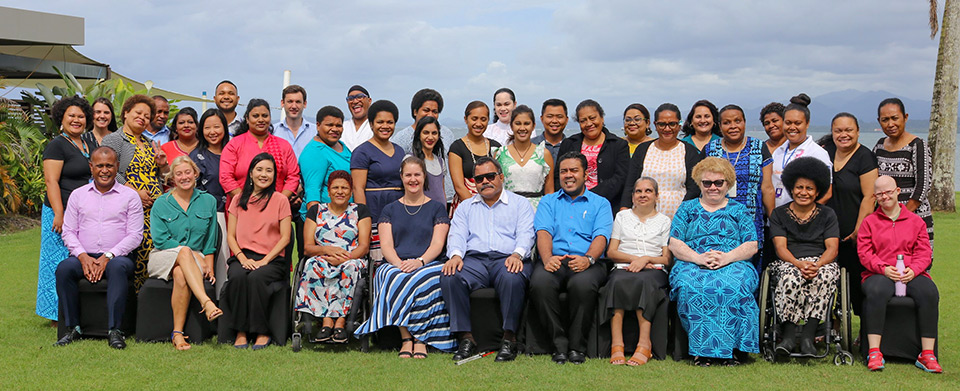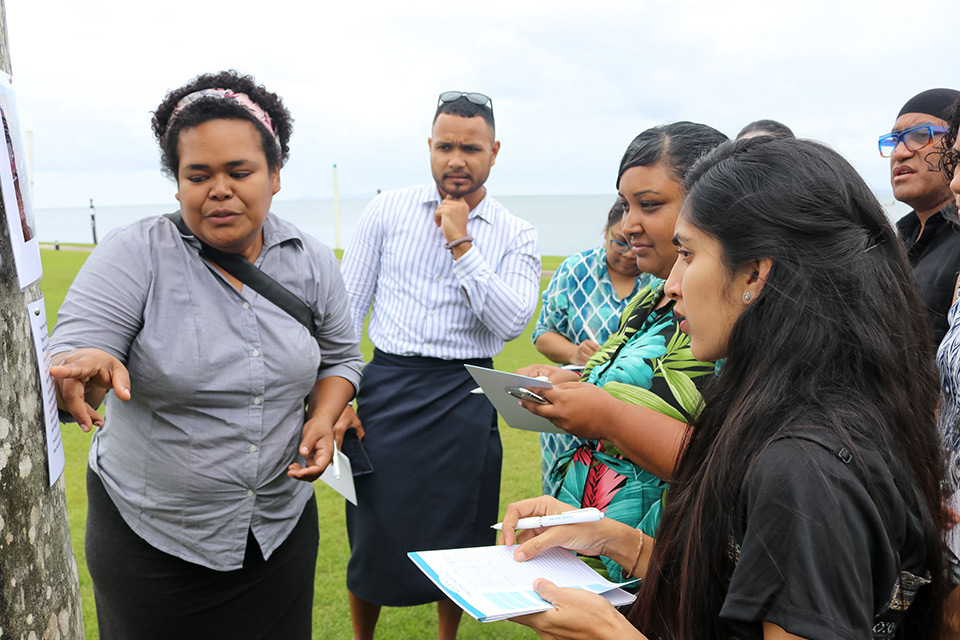Disability Inclusion in Humanitarian Preparedness and Response a Priority
Date:
![[Logo]](/sites/default/files/Field%20Office%20ESEAsia/Images/2020/10/fj-231020_Disability-partners-960px.jpg)
[Press Release]

SUVA, Fiji Islands — Understanding and mitigating challenges faced by persons with disabilities during disaster preparedness and response was the key focus of a workshop led by the Pacific Disability Forum (PDF) this week.
The two-day workshop, which was organized in collaboration with the Pacific Humanitarian Protection Cluster (PHPC), aimed to strengthen the understanding and practice of disability inclusion in humanitarian preparedness and response amongst members of the Cluster.

According to the World Health Organization, 15 per cent of the global population are persons with disabilities and a United Nations Economic and Social Commission for Asia and the Pacific (UN ESCAP) report states that there are 1.7 million people with disabilities in the Pacific who are particularly at risk in situations of natural and man-made disasters, as well as to consequences of climate change and environmental degradation. However, this group of people are largely excluded from disaster risk reduction as well as humanitarian response programs although disasters, humanitarian crisis and conflicts often cause and, or exacerbates the disability.
“There are many policies and guidelines on disability inclusion, now is the time to translate that into action on the ground, working with those who are key actors in humanitarian preparedness and response,” said Setareki Macanawai, PDF Chief Executive Officer.
PHPC is led by the UN Women Fiji Multi-Country Office and consists of 28 organizations including regional organizations, United Nations agencies, international non-governmental organizations and civil society organizations, and continues work on response for the complex emergency of Tropical Cyclone Harold and COVID-19, with planning for recovery phase and the next cyclone season.
“As the Protection Cluster, it is our role to ensure that humanitarian response is accessible to persons with disabilities and they can also participate and influence disaster preparedness, response and recovery work,” said UN Women Deputy Representative Melissa Stutsel.
“This workshop is meant to provide the tools for us to advocate for inclusion of persons with disabilities.”
The workshop also aligned to the theme of International Disaster Risk Reduction Day for 2020 (October 13) which is “It is all About Governance”, alongside the Pacific Disability Forum month-long campaign – “Now is the Time (Oqo Iska Time)” which acts as a catalyst for all government and civil society humanitarian agencies and other key stakeholders to effectively include persons with disabilities in any humanitarian action.The workshop, which ended yesterday focused on some key topics under disability inclusion, such as direct physical, emotional and psychosocial impact of persons with disabilities during emergencies, national disasters, and other humanitarian situations, intersectional challenges faced by persons with disabilities including violence and abuse, the application of the pre-conditions to inclusion and human rights guidelines on persons with disabilities in a humanitarian crisis and data collection – identification of person with disabilities in humanitarian crisis.
For more information please contact:
Paradise Tabucala
Communications Officer – Pacific Disability Forum
Email: paradisetabucala@pacificdisability.org | Phone: 7720128.
Sarika Chand
UN Women Fiji Multi Country Office - Media and Communications Specialist
Email: sarika.chand@unwomen.org | Phone: 9239857